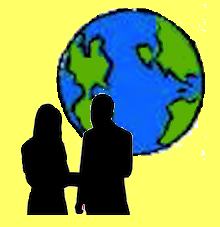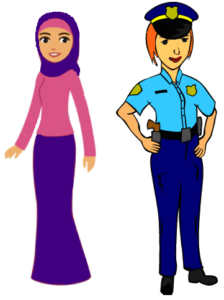I have been uncomfortable for many years with the lack of guidance about the specific discrimination black volunteers and black professional humanitarian workers face when they go abroad. I’ve seen the discrimination, firsthand: at airports, in restaurants, in shops and even on the streets in countries all over the world without many black residents – including Germany and Afghanistan. And I’ve heard so many first-hand horror stories from humanitarian colleagues about what they’ve experienced. Yet, when I’ve tried to find guidance on how to be an ally or guidance for people experiencing discrimination, I’ve found nothing.
So I was impressed that the Peace Corps starkly and specifically acknowledged this situation and was frank about just how much harder it can be for black volunteers – specifically for Ukraine, but the reality is that this warning would be valid for a variety of countries where the Peace Corps has, or used to, place members, including Russia. The Peace Corps recommends that the Black volunteers react to racism in various ways depending on the situation, choosing to “remove themselves” from the situation for their own safety, get help from other volunteers or staff, or practice and explore self-care or coping strategies. It’s similar to the recommendations for women humanitarian workers – or women travelers: when you are in a country where you may not be respected, you’ve got to be prepared to deal with ugly comments and ugly situations and you won’t have the resources you have in the USA (not that law enforcement in my country always takes a woman’s safety concerns seriously, but I digress).
This article in the Atlanta Black Star says “Some have rebuked the Peace Corps for not doing more to protect Black volunteers.” One person tweeted that the Peace Corps shouldn’t send black Americans “to a place like this where you know they’ll be racially abused” and claimed that the Peace Corps was placing “the burden of educating racists” on the shoulders of Black members.
I think it would be a terrible shame if the Peace Corps didn’t send black Americans to Ukraine or anywhere in Eastern Europe or Asia or anywhere else where there is not a large black population, or if the United Nations didn’t send black African professional humanitarians to Afghanistan or elsewhere in Asia and on and on. Absolutely, people need to be safe, and there has to be a consideration for what specific challenges an African, a woman, a trans person, a person of a particular nationality, and others may face in various countries – and it may mean not sending a great candidate somewhere because the security situation is just too tenuous for the person, specifically. But while the Peace Corps’ primary mission is to empower communities in underserved parts of the work, the corps is also intended to promote mutual understanding between citizens of the USA and foreign peoples. Black Americans are a part of the rich fabric that makes up the USA. You cannot understand this country without experiencing its very specific forms of black culture.
I’m going to continue to do all I can, including abroad, to be an ally. I stumble, sometimes I flounder, often I misstep, but I’m going to keep trying. And I hope everyone else will too, not only for Black Americans but for any person who might be targeted for insults, harassment, abuse or violence.
I’m also going to continue to try to encourage people, especially women, to travel abroad, while also offering realistic safety recommendations (and I’ve been criticized for my recommendations by women travelers who say they have never experienced any problems and I’m being alarmist. Sigh.).
When your perceived race, sexual identity, religion or nationality can put you in danger in a region, you have every right to know of the specific dangers you might face, and you have every right to reconsider going to that region. And when you feel insulted anywhere, you have every right to choose how you are going to react, based on what you think is the appropriate thing to do.
I know if I made a list of everything that has been said to me by local people where I’m living or working, targeting me as a woman or as an American, I would scare a lot of folks from traveling abroad. Sometimes, I have pushed back: I’ve sometimes expressed anger, I’ve sometimes expressed hurt feelings, and I’ve sometimes just walked away – it depends on how safe I feel and what I think the consequences might be. It’s all my choice to make. I hope that my reactions have sometimes helped to change some local people’s minds – but I can only do so much.
What do you think of its advisory to applicants about racism they may face? Share your thoughts in the comments.
For those who think the Peace Corps, or any other volunteering abroad or humanitarian agency, should “do more” to “protect” black volunteers & humanitarian workers, what would that look like? Share your thoughts in the comments.
- GirlGuiding Attempt at Inclusion Raises Ire of Many.
- Lessons from UN Cares re LGBTI inclusion in the workforce.
- Systemic Exclusion in Volunteer Engagement.
- More: systemic racism in volunteer engagement.
- Evaluation Re: Peace Corps’ Sexual Assault Risk Reduction & Response Program.
- Peace Corps Volunteer Protection Act of 2011 (for Kate Puzey).
- Survey for Returned Peace Corps Volunteers Re: Safety.
- Peace Corps must better address assaults and murders of members.
- Managers of volunteers & resistance to diversity.
- Decolonizing International Aid (including international volunteering).
- Accessibility, diversity & virtual volunteering.
- Video Advocating for Diversity in Volunteer Engagement is NOT Easy: a 11:45 video about the pushback you will get when you talk about the need for diversity in volunteer engagement (2020).
- Recruiting Local Volunteers To Increase Diversity Among the Ranks (also explores the WHY).

If you have benefited from this blog or other parts of my web site or my YouTube videos and would like to support the time that went into researching information, developing material, preparing articles, updating pages, etc. (I receive no funding for this work), here is how you can help.


